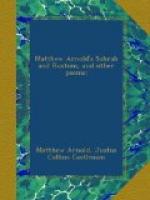=Arnold as a Writer of Epic and Elegy=.—Epic poetry narrates in grand style the achievements of heroes—the poet telling the story as if present. It is simple in construction and uniform in meter, yet it admits of the dialogue and the episode, and though not enforcing a moral it may hold one in solution. Elegiac poetry is plaintive in tone and expresses sorrow or lamentation. Both epic and elegy are inevitably serious in mood, and slow and stately in action. In these two forms of verse Arnold was at his best. Stockton pronounced Sohrab and Rustum the noblest poem in the English language. Another critic has said that “it is the nearest analogue in English to the rapidity of action, plainness of thought, plainness of diction, and nobleness of Homer.” Combining, as it does, classic purity of style with romantic ardor of feeling, it stands a direct exemplification of Arnold’s poetic theories, as set forth in the preface of his volume of 1853. Especially is it successful in emphasizing his idea of unity of impression; “while the truth of its oriental color, the deep pathos of the situation, the fire and intensity of the action, the strong conception of character, and the full, solemn music of the verse, make it unquestionably the masterpiece of Arnold’s longer poems, among which it is the largest in bulk and also the most ambitious in scheme.” Balder Dead, a characteristic Arnoldian production, founded upon the Norse legend of Balder, Lok, and Hader, though not so great as Sohrab and Rustum, has much poetic worth and ranks high among its kind; and Tristram and Iseult, with its infinite tragedy, and The Sick King in Bokhara, gorgeous in oriental color, are rare examples of the lyrical epic. The Forsaken Merman and Saint Brandan, which are dealt with elsewhere in this volume, are good examples of his shorter narrative poems. In Thyrsis, the beautiful threnody in which he celebrated his dead friend, Clough, Arnold gave to the world one of its greatest elegies. One finds in this poem and its companion piece, The Scholar-Gipsy, the same unity of classic form with romantic feeling present in Sohrab and Rustum. Both are crystal-clear without coldness, and restrained without loss of a full volume of power. Mr. Saintsbury, writing of The Scholar-Gipsy, says: “It has everything—a sufficient scheme, a definite meaning and purpose, a sustained and adequate command of poetical presentation, and passages and phrases of the most exquisite beauty;” and no less praise is due Thyrsis. Other of his elegiac poems are Heine’s Grave, Stanzas from the Grande Chartreuse, Stanzas in Memory of the Author of “Obermann,” Obermann Once More, Rugby Chapel, and Memorial Verses, the two last named being included in this volume. In such measures as are used in these poems, in the long, stately, swelling measures, whose graver movements accord with a serious and elevated purpose, Arnold was most at ease.




